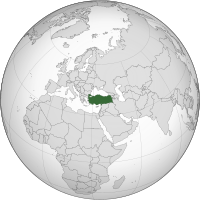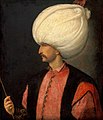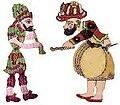Merhaba! Türkiye portalına hoşgeldiniz. Hi! Welcome to the Turkey portal.
 | |

| |
Turkey, officially the Republic of Türkiye, is a country mainly in Anatolia in West Asia, with a smaller part called East Thrace in Southeast Europe. It borders the Black Sea to the north; Georgia, Armenia, Azerbaijan, and Iran to the east; Iraq, Syria, and the Mediterranean Sea (and Cyprus) to the south; and the Aegean Sea, Greece, and Bulgaria to the west. Turkey is home to over 85 million people; most are ethnic Turks, while ethnic Kurds are the largest ethnic minority. Officially a secular state, Turkey has a Muslim-majority population. Ankara is Turkey's capital and second-largest city; Istanbul is its largest city, and its economic and financial center, as well as the largest city in Europe. Other major cities include İzmir, Bursa and Antalya.
Human habitation began in the Late Paleolithic. Home to important Neolithic sites like Göbekli Tepe and some of the earliest farming areas, present-day Turkey was inhabited by various ancient peoples. Hattians were assimilated by the incoming Anatolian peoples. Increasing diversity during Classical Anatolia transitioned into cultural Hellenization following the conquests of Alexander the Great; Hellenization continued during the Roman and Byzantine eras. The Seljuk Turks began migrating into Anatolia in the 11th century, starting the Turkification process. The Seljuk Sultanate of Rum ruled Anatolia until the Mongol invasion in 1243, when it disintegrated into Turkish principalities. Beginning in 1299, the Ottomans united the principalities and expanded; Mehmed II conquered Istanbul in 1453. During the reigns of Selim I and Suleiman the Magnificent, the Ottoman Empire became a global power. From 1789 onwards, the empire saw major transformation, reforms, and centralization while its territory declined.
In the 19th and early 20th centuries, persecution of Muslims during the Ottoman contraction and in the Russian Empire resulted in large-scale loss of life and mass migration into modern-day Turkey from the Balkans, Caucasus, and Crimea. Under the control of the Three Pashas, the Ottoman Empire entered World War I in 1914, during which the Ottoman government committed genocides against its Armenian, Greek and Assyrian subjects. After its defeat, the Ottoman Empire was partitioned. The Turkish War of Independence resulted in the abolition of the sultanate in 1922 and the signing of the Treaty of Lausanne in 1923. The Republic was proclaimed on 29 October 1923, modelled on the reforms initiated by the country's first president, Mustafa Kemal Atatürk. Turkey remained neutral during most of World War II, but was involved in the Korean War. Coups in 1960 and 1980 interrupted the transition to a multi-party system.
Turkey is an upper-middle-income and emerging country; its economy is the 18th- or 11th-largest in the world. It is a unitary presidential republic. Turkey is a founding member of the OECD, G20, and Organization of Turkic States. With a geopolitically significant location, Turkey is a regional power and an early member of NATO. An EU-candidate, Turkey is part of the EU Customs Union, CoE, OIC, and TURKSOY. Turkey has coastal plains, a high central plateau, and various mountain ranges; its climate is temperate with harsher conditions in the interior. Home to three biodiversity hotspots, Turkey is prone to frequent earthquakes and is highly vulnerable to climate change. Turkey has universal healthcare, growing access to education, and increasing innovativeness. It is a leading TV content exporter. With 21 UNESCO World Heritage sites, 30 UNESCO intangible cultural heritage inscriptions, and a rich and diverse cuisine, Turkey is the fourth most visited country in the world. (Full article...)
Selected article -
The Gallipoli campaign, the Dardanelles campaign, the Defence of Gallipoli or the Battle of Gallipoli (Turkish: Gelibolu Muharebesi, Çanakkale Muharebeleri or Çanakkale Savaşı) was a military campaign in the First World War on the Gallipoli peninsula (now Gelibolu) from 19 February 1915 to 9 January 1916. The Entente powers, Britain, France and the Russian Empire, sought to weaken the Ottoman Empire, one of the Central Powers, by taking control of the Ottoman straits. This would expose the Ottoman capital at Constantinople to bombardment by Entente battleships and cut it off from the Asian part of the empire. With the Ottoman Empire defeated, the Suez Canal would be safe and the Bosphorus and Dardanelles straits would be open to Entente supplies to the Black Sea and warm-water ports in Russia.
In February 1915 the Entente fleet failed when it tried to force a passage through the Dardanelles. The naval action was followed by an amphibious landing on the Gallipoli peninsula in April 1915. In January 1916, after eight months' fighting, with approximately 250,000 casualties on each side, the land campaign was abandoned and the invasion force was withdrawn. It was a costly campaign for the Entente powers and the Ottoman Empire as well as for the sponsors of the expedition, especially the First Lord of the Admiralty (1911–1915), Winston Churchill. The campaign was considered a great Ottoman victory. In Turkey, it is regarded as a defining moment in the history of the state, a final surge in the defence of the motherland as the Ottoman Empire retreated. The struggle formed the basis for the Turkish War of Independence and the declaration of the Republic of Turkey eight years later, with Mustafa Kemal Atatürk, who rose to prominence as a commander at Gallipoli, as founder and president. (Full article...)General images
Did you know -
- ... that the construction of the Çanakkale Martyrs' Memorial (pictured), commemorating over 250,000 Turkish soldiers fallen during the Battle of Gallipoli in WWI, was completed with nationwide financial contributions? (January 11, 2008) Wikipedia:Recent additions 199
- ... that Vakifli is the only ethnic Armenian village in Turkey? (February 26, 2007) Wikipedia:Recent additions 121
- ... that the Battle of Wawon is considered to be Turkey's first real combat action since the end of World War I? (December 1, 2009)
- ... that the church of Hagia Thekla in Constantinople, now a mosque, was rebuilt by Emperor Isaac I Komnenos as thanks for surviving a hunting accident? (January 15, 2008) Wikipedia:Recent additions 200
- ... that Turkish poet Süleyman Nazif witnessed first hand the decaying corpses of persecuted Christians in his home town of Diyarbakır in July 1915? (November 17, 2008) Wikipedia:Recent additions 235
- ... that the Roman Catholic Church of St. Mary Draperis in Istanbul has been leveled by earthquake, forcibly demolished by the Ottoman Government, and destroyed three times by fire? (March 24, 2012)
- ... that the world's longest tunnel system is the two parallel tunnels at the Atatürk Dam of Şanlıurfa in southeastern Turkey? (February 14, 2008)
Selected picture
Selected biography -
Sıla Gençoğlu (born 17 June 1980) is a Turkish singer-songwriter. She was born in Acıpayam, Denizli, and later moved to İzmir and then to Istanbul to finish her studies. She started to learn performing arts at high school. After studying jazz at Istanbul Bilgi University, she became a backing vocalist for Kenan Doğulu.
Sıla released her self-titled debut album in 2007. The song "...Dan Sonra" became a number-one hit on Türkçe Top 20, and after critical and commercial success she released the albums İmza (2009), Konuşmadığımız Şeyler Var (2010), Vaveyla (2012), Yeni Ay (2014) and Mürekkep (2016) all of which were praised by fans and critics alike. A number of songs in these albums, including "Sevişmeden Uyumayalım", "Acısa da Öldürmez", "Kafa", "Boş Yere", "Vaziyetler", "Yabancı" and "Hediye", became number-one hits in Turkey. The songs "Yoruldum", "İmkânsız" and "Zor Sevdiğimden" ranked among the top five on Turkey's music charts. (Full article...)Selected video -
Selected quote -
| “ | Today the Soviet Union is a friend and an ally. We need this friendship. However, no one can know what will happen tomorrow. Just like the Ottoman and Austro-Hungarian Empires it may tear itself apart or shrink in size. The people that it holds so tightly in its grip may one day slip away. The world may see a new balance of power. It is then that Turkey must know what to do. Ally Soviets have under their control our brothers with whom we share language, beliefs and roots. We must be prepared to embrace them. Being ready does not mean that we will sit quietly and wait. We must get ready. How does a people get prepared for such an endeavour? By strengthening the natural bridges that exist between us. Language is a bridge... Religion is a bridge... History is a bridge... We must delve into our roots and reconstruct what history has divided. We can't wait for them to approach us. We must reach out to them. | ” |
Recognized content
Provinces
Related portals
Religions in Turkey
Neighbouring countries
Countries with related heritage
WikiProjects
Turkish wikipedia
 |
There is a Turkish version of Wikipedia, the free encyclopedia. |
Wikimedia
The following Wikimedia Foundation sister projects provide more on this subject:
-
Commons
Free media repository -
Wikibooks
Free textbooks and manuals -
Wikidata
Free knowledge base -
Wikinews
Free-content news -
Wikiquote
Collection of quotations -
Wikisource
Free-content library -
Wikiversity
Free learning tools -
Wikivoyage
Free travel guide -
Wiktionary
Dictionary and thesaurus














































































































